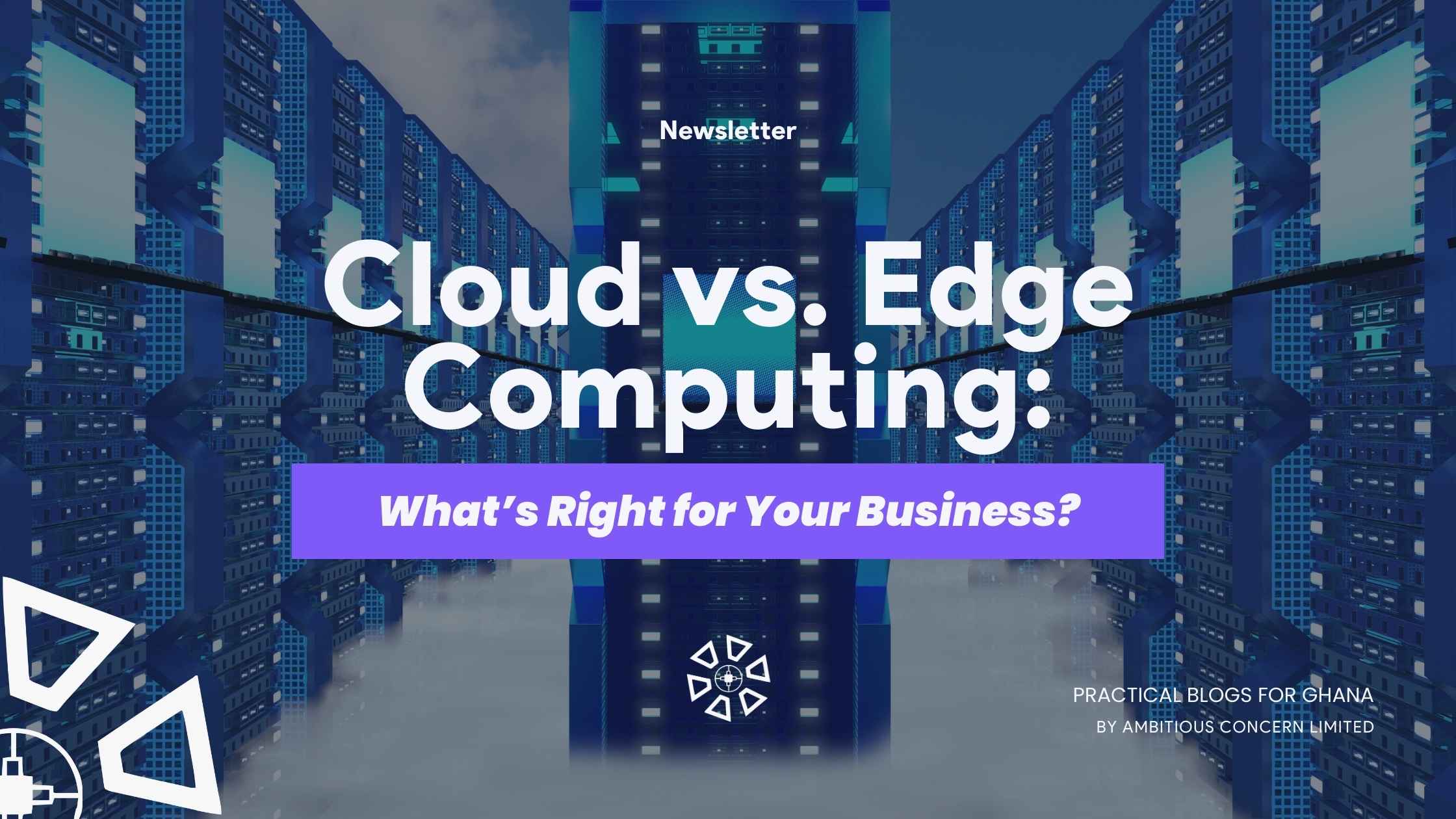Cloud vs. Edge Computing: What’s Right for Your Business?
Weighing these options is critical to staying competitive in a changing digital economy.

Cloud vs. Edge Computing: What’s Right for Your Business?
In today’s tech-driven world, businesses must decide where to run their computing workloads. Cloud computing (remote servers accessed over the Internet) and edge computing (local processing near the data source) each offer advantages. Globally, rising data volumes, IoT devices, and AI workloads make this choice more important than ever. Even in Africa, cloud adoption is rising, driven by growing Internet access, entrepreneurship, and demand for scalable IT. At the same time, unreliable networks and limited infrastructure in many regions mean that processing data closer to users – at the edge – can deliver faster results and better reliability. For Ghanaian and West African businesses, weighing these options is critical to staying competitive in a changing digital economy.
What Is Cloud Computing?
Cloud computing means running applications and storing data on remote servers accessed over the Internet. Instead of buying and managing their own servers, companies can tap on-demand resources such as storage, databases, and software provided by cloud vendors. This model offers scalability and pay-as-you-go cost.
Benefits:
- Eliminates large upfront hardware costs
- Offers virtually unlimited capacity on demand
- Providers manage most infrastructure and updates
- Strong backup and redundancy improve disaster recovery
Limitations:
- Relies on Internet connectivity, which can be inconsistent in Ghana and West Africa
- High data transfer costs for large files
- Potential privacy and regulatory concerns
- Ongoing subscription costs can add up
Trends in Ghana and West Africa: Cloud adoption is accelerating as data centers and undersea cables expand connectivity. Businesses are increasingly using hybrid-cloud setups, keeping sensitive data on-premises while leveraging public clouds for flexibility. Governments and regulators are also creating guidelines to support safe cloud adoption.
What Is Edge Computing?
Edge computing pushes data processing closer to where it is generated. Instead of sending everything to the cloud, smart devices and local servers perform tasks on-site or nearby. This is critical for Internet of Things (IoT) devices, real-time analytics, and applications where split-second decisions are needed.
Benefits:
- Low latency and immediate responsiveness
- Reduces bandwidth usage by filtering data locally
- Keeps sensitive data on-site, enhancing privacy
- Supports operations even with weak or unreliable Internet
Challenges:
- Requires more capital investment and local maintenance
- Harder to scale across multiple sites
- Limited compute power compared to the cloud
- Expands the number of devices that need to be secured
Edge in Ghana and West Africa: Edge computing is gaining attention as businesses look for faster, more secure, and more reliable solutions. For example, local data processing reduces the impact of undersea cable outages that have disrupted Internet services in recent years. Ghanaian companies are exploring edge computing for agriculture, telemedicine, and manufacturing.
Cloud vs. Edge: Key Comparisons
- Latency and Performance: Edge delivers faster response times, while cloud offers massive compute power for large-scale tasks.
- Scalability: Cloud is highly elastic, while edge is limited to site-specific resources.
- Cost: Cloud reduces upfront costs but may be expensive over time. Edge requires investment in hardware but lowers bandwidth costs.
- Data Control: Edge keeps sensitive data local, while cloud requires trusting third-party providers.
- Maintenance: Cloud is managed by vendors, while edge requires on-site support.
Use Cases by Sector
- Agriculture: Drones and IoT sensors process crop and soil data locally for faster insights and reduced bandwidth usage.
- Finance: Cloud powers mobile money platforms, while edge supports offline-first transaction processing in low-connectivity areas.
- Healthcare: Telemedicine benefits from local edge servers that ensure reliable consultations even with poor Internet.
- Manufacturing: Edge enables predictive maintenance and real-time control on the factory floor.
- Retail: Edge supports smart shelves, self-checkout, and real-time customer analytics.
Hybrid Cloud–Edge Models
Many businesses adopt hybrid models, using the cloud for core services and edge for localized, real-time tasks. This approach balances scalability, cost, and resilience. For example, an agricultural company might analyze farm data locally with edge devices while storing historical data in the cloud.
Decision-Making Checklist
When choosing between cloud, edge, or hybrid, consider:
- How time-sensitive is your application?
- How much data do you generate and transfer?
- How reliable is your Internet connectivity?
- Do regulations require data to stay local?
- How variable are your workloads?
- Do you have the expertise to maintain local systems?
Strategic Guidance for Ghana and West Africa
For businesses in Ghana and West Africa, adopting the right computing model is a strategic decision. Cloud services bring scalability and innovation, while edge computing offers control, speed, and resilience. The future is likely to be hybrid, with businesses using both models together. By investing in infrastructure, skills, and pilot projects, companies in the region can build competitive, secure, and future-ready digital strategies.
Fresh Perspectives, Timeless Wisdom Explore Our Latest Blog Edition
View AllJoin our newsletter to stay up to date on features and releases
Stay in the loop with exclusive updates, sneak peeks, and insider tips that will elevate your experience. Don’t miss out



